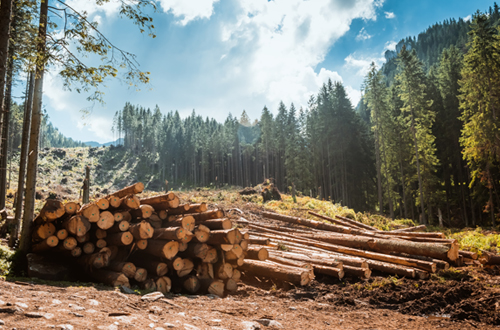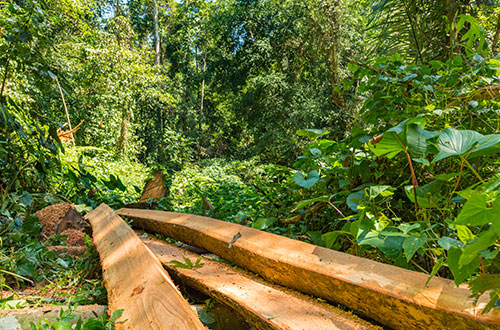WOOD IS A RAW MATERIAL OF THE FUTURE.
Only as much wood as will grow back again indefinitely is removed from a sustainably managed forest. The forest can fulfil its varied functions (such as providing a habitat for animals and plants; acting as a CO2 sink, water filter and reservoir; recreation purposes). This principle of sustainability, which is known and demanded everywhere today, had its origins in the early 18th century and is as topical today as ever.
Modern forestry combines the knowledge of recent centuries and is now becoming more and more active in adapting the forest to climate change and changing demands. Forestry uses sustainable, near-natural forest management principles to ensure that forests are not overutilised. Every year, less wood is harvested than grows back in the same period.


The use of wood ensures sustainability and helps to protect the climate because wood binds carbon from the air and acts as a CO2 sink. The consistently important factor is that the wood being used comes from sustainable forestry. This is the only way to prevent uncontrolled clearing of virgin forests in the South American tropics, for example, as well as in Eastern European countries, Asia or Africa.
In Germany, forest management is “lawful and sustainable” and is based on federal and state forest laws. Wood harvested in Germany is always sustainable. Imports of timber are subject to current EU and international agreements such as the European Timber Trade Regulation (EUTR) and the Timber Trade Security Act (Holzhandelssicherungsgesetz; HolzSiG) in Germany. They provide an import framework for timber aimed at preventing tropical forest destruction, overutilisation and the marketing of illegally logged timber.
In addition, forest owners can submit to a voluntary certification process to document and certify the sustainability of their forest management. The specific requirements of a certification go beyond those of the forest laws. Logging in the country of origin must not only be legal, but must also comply with strict principles of sustainability such as ecological and social standards. Certification systems such as FSC® and PEFC define sustainability at a high level by imposing additional management requirements.
In view of climate change, climate protection and the conservation of raw materials and resources are becoming the primary challenges of our time. Sustainably produced wood from structurally complex forests has the potential to replace more and more frequently materials based on fossil resources and energy sources, conserving finite resources while simultaneously protecting the climate.


The image of tropical timber continues to be an important and much-discussed topic. In the meantime, a lot has happened in the management of tropical forests. But unfortunately, there are still cases of reckless and illegal logging in tropical rainforests, even if their number has declined. GD Holz tirelessly advocate the nature-friendly and sustainable management of forests so that the long-term supply of the renewable raw material wood can be assured. This protects the rainforests and prevents land from being converted into other forms of use (e.g. soy or palm oil plantations). All in the interest of the environment, the climate and humanity.
More on this topic …

